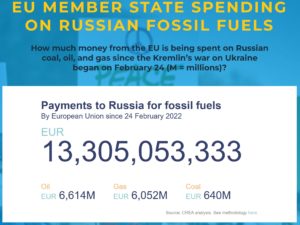Co-author of Tania Babina of Columbia University, Tetyana Balyuk of Emory University, Anastassia Fedyk of UC Berkeley
European Union (EU) countries have paid more than $ 13 billion for Russian oil, gas and coal since Russia invaded Ukraine on February 24, 2022. Meanwhile, Ukraine is heroically defending not only its own freedom, but also the EU’s freedom. and other democracies around the world. The discrepancy between the sacrifices made by the Ukrainians and the lack of sacrifices made by the EU countries cannot be further accentuated.
Ukraine is giving its all to fight Russia, while the rest of Europe is silent on one crucial issue: Russian energy. It is clear that the EU has the key to forcing Putin to stop this war and prevent the world from slipping into the law of the jungle. Without energy revenues, the Russian economy will suffer a blow that no dictator can afford.
So why not do it now, when time is so vital for Ukraine’s survival and the safety of other countries? German Chancellor Olaf Scholz and other EU leaders are suggesting that stopping Russian energy imports could push their economies into recession. Prominent economists in Western Europe disagree. In addition, politics must not be expressed in “all or nothing” terms, and the free world has a set of levers to economically destroy Putin’s war machine.
For example, EU countries use natural gas for heating and electricity generation. But electricity can come from a variety of sources, allowing the EU to replace electricity generated by gas-fired power plants with electricity generated elsewhere, including existing nuclear power plants in Europe and renewable energy options such as geothermal and green hydrogen. Natural gas can also come from places other than Russia. In general, although Europe’s current dependence on Russian oil is unsettling, the situation is not as serious as it seems at first glance. For almost a decade of low energy prices, Western companies such as Chevron have focused on making substantial efficiency gains. Now that crude oil prices reach $ 115 / Bbl, producers who traditionally have higher costs, such as those in the United States, are ready to expand their supply.
In the short term, the EU can impose a 90% punitive tax on Russian energy, as Ricardo Hausmann has suggested. He claims that because the energy supply is inelastic, the impact of this tax will fall on Russia. Russia’s dependence on pipelines to transport gas limits its ability to materially divert natural gas flows from Europe to other destinations. In addition, Russia has limited gas storage capacity and existing ones are almost full. What will Russia do if it cannot sell or store the natural gas it produces? The EU has a number of precedents for punitive tariffs, even on better-performing countries. By choosing between no income and some income, Russia will have no choice. A similar point applies to oil.
If the EU can significantly reduce its Russian energy consumption – say 80%, which does not require a reduction in total Russian energy consumption and corresponds to a reduction in the EU’s total energy consumption by only 32% for gas and 24% for oil – Putin’s regime will lose cash flows that are critical to him in the current conditions. Russia’s dependence on energy is not a necessary condition for Europe. Prior to the 1990s, attempts by the USSR to expand energy supply in Europe were largely resisted – the JFK to Ronald Reagan administrations understood the danger of a potential dependence on Soviet energy – and only a small part of European energy imports came from from Russia. Charging Europe with Russian energy is possible and will be less costly for Europe than for Russia.
There is no doubt that Putin will try to sell Russian oil to other countries that are less concerned with the morale of the Russian war in Ukraine. The widespread spread between the Urals (a mixture of Russian oil) and Brent (a reference oil mixture in the North Sea) already suggests that there are limits to such diversions, but more are coming. A financial crisis with a snowball has already put Russia on the brink of insolvency. The Russian government is threatening to nationalize the foreign-owned assets of a torrent of companies leaving Russia. Russian airlines refuse to return the leased aircraft. These events mean that creditors will be pursuing Russian assets around the world. Russian tanks will be arrested as soon as they enter a port of a country that recognizes international law. into
